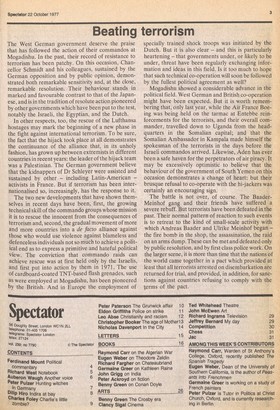Beating terrorism
The West German government deserve the praise that has followed the action of their commandos at Mogadishu. In the past, their record of resistance to terrorism has been patchy. On this occasion, Chancellor Schmidt and his colleagues, sustained by the German opposition and by public opinion, demonstrated both remarkable sensitivity and, at the close, remarkable resolution, Their behaviour stands in marked and favourable contrast to that of the Japanese, and is in the tradition of resolute action pioneered by other governments which have been put to the test, notably the Israeli, the Egyptian, and the Dutch.
In other respects, too, the rescue of the Lufthansa hostages may mark the beginning of a new phase in the fight against international terrorism. To be sure, the fact that the hijack took place at all demonstrates the continuance of the alliance that, in its unholy fashion, has grown up between extremists in different countries in recent years: the leader of the hijack team was a Palestinian. The German government believe that the kidnappers of Dr Schleyer were assisted and sustained by other — including Latin-American — activists in France. But if terrorism has been internationalised so, increasingly, has the response to it.
The two new developments that have shown themselves in recent days have been, first, the growing technical skill of the commando groups whose mission it is to rescue the innocent from the consequences of terrorism and, second, the gradual movement of more and more countries into a de facto alliance against those who would use violence against blameless and defenceless individuals not so much to achieve a political end as to express a primitive and hateful political view. The conviction that commando raids can achieve rescue was at first held only by the Israelis, and first put into action by them in 1971. The use of cardboard-coated TNT-based flash grenades, such as were employed at Mogadishu, has been pioneered by the British. And in Europe the employment of specially trained shock troops was initiated by the Dutch. But it is also clear — and this is particularly heartening — that governments under, or likely to be under, threat have been regularly exchanging information and ideas in this field. Is it too much to hope that such technical co-operation will soon be followed by the fullest political agreement as well?
Mogadishu showed a considerable advance in the political field. West German and British co-operation might have been expected. But it is worth remembering that, only last year, while the Air France Boeing was being held on the tarmac at Entebbe reinforcements for the terrorists, and their overall commander, travelled down to Uganda from the headquarters in the Somalian capital; and that the Somalian Ambassador in Kampala made himself the spokesman of the terrorists in the days before the Israeli commandos arrived. Likewise, Aden has ever been a safe haven for the perpetrators of air piracy. It may be excessively optimistic to believe that the behaviour of the government of South Yemen on this occasion demonstrates a change of heart: but their brusque refusal to co-operate with the hi-jackers was certainly an encouraging sign.
The battle is not over, of course. The BaaderMeinhof gang and their friends have suffered a severe rebuff. But terrorists have been defeated in the past. Their normal pattern of reaction to such events is to retreat to the kind of small-scale activity with which Andreas Baader and Ulrike Meinhof began — the fire bomb in the shop, the assassination, the raid on an arms dump. These can be met and defeated only by public resolution, and by first class police work. On the larger scene, it is more than time that the nations of the world came together in a pact which provided at least that all terrorists arrested on disembarkation are returned for trial, and provided, in addition, for sanctions against countries refusing to comply with the terms of the pact.


































 Previous page
Previous page